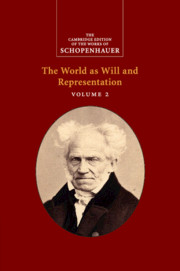Chapter 25 - Transcendent Considerations Concerning the Will as Thing in Itself
Published online by Cambridge University Press: 30 June 2022
Summary
Even the merely empirical consideration of nature recognizes a constant transition from the simplest and most necessary expression of some universal force of nature up to human life and consciousness, through steady gradations and boundaries that aremerely relative – and indeed for the most part vague and ill-defined. Reflecting more deeply on this insight soon leads to the conviction that in all of these appearances the inner essence, what manifests itself, what appears, is one and the same thing, emerging with ever greater clarity; and that what presents itself in millions of configurations of endless diversity so that it stages the most variegated and baroque theatre piece, one without beginning and end, is this single being, hiding behind all these masks and so tightly wrapped that it does not recognize itself and as a result often treats itself badly. This is why the great doctrine of ‘one and all’ emerged early in both the Orient as well as the Occident, and has maintained and even renewed itself despite all opposition. But we are already more deeply initiated into the mystery because the foregoing has led us to the view that, when this being that underlies all appearances is adjoined to a cognitive consciousness in some one of these individual appearances, a consciousness that becomes self-consciousness by being directed inwards, then this being will present itself to self-consciousness as something both familiar and mysterious, something denoted by the word will. Accordingly, we have called that universal basic essence of all appearances the will after the manifestation in which it allows itself to be recognized with a minimum of veiling. So the word will does not at all refer to some unknown x, but on the contrary refers to something more well-known and familiar to us, at least from one side, than anything else.
Let us now recall a truth that is most thoroughly and comprehensively proven in my prize essay On the Freedom of the Will, namely that by dint of the law of causality, which holds without exception, the doing or acting of every being in this world always appears as strictly necessitated by the causes that elicit the same effects each time they occur.
- Type
- Chapter
- Information
- Schopenhauer: The World as Will and Representation , pp. 331 - 340Publisher: Cambridge University PressPrint publication year: 2018



